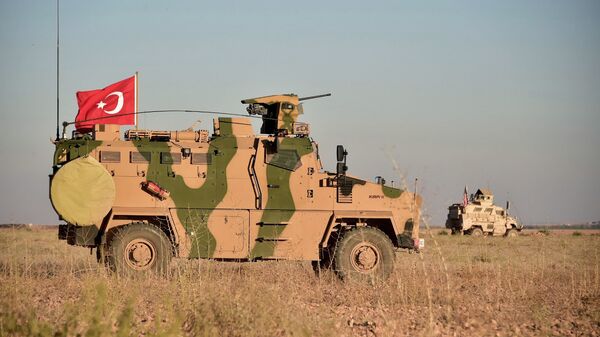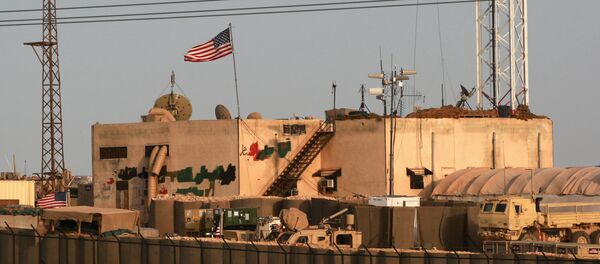The US and Turkey have yet again found themselves on thin ice after mutual reprimands between US National Security Adviser John Bolton and Turkish President Recep Tayyip Erdogan over the fate of the US-backed Kurdish-dominated Syrian Democratic Forces (SDF).
While Bolton castigated Erdogan's recent New York Times op-ed on the US withdrawal as "wrong and offensive", the Turkish president slammed the national security adviser's conditions for the American pull-out from Syria as a "serious mistake".
"Bolton is making a big mistake, his statement is unacceptable. Terrorist organisations do not represent the Kurds," Erdogan stated on 8 January, abruptly cancelling a meeting with the Trump administration official.
However, in the eyes of Ankara, the YPG is nothing more than an affiliate of the Kurdistan Workers' Party (PKK), which has long been outlawed in Turkey.
"For Turkey, there is no difference between PKK, YPG, PYD or Daesh. The YPG's fight against Daesh was a huge lie," Erdogan told members of his Justice and Development (AK) Party on Tuesday.
US Will Get Out of Syria 'Over a Period of Time'
Trump's decision to pull the 2,000-strong US military contingent out of Syria following his phone conversation with Erdogan on 14 December received cautious welcome from Ankara.
"This is certainly not an open-ended waiting process," Erdogan said on 21 December while speaking at Turkey's Top 500 Service Exporters Award Ceremony.
He noted that Ankara would postpone an operation against Syrian Kurdish fighters east of the Euphrates amid the US withdrawal. Nevertheless, he highlighted that "it is a must for everyone to know that in the months ahead we are going to pursue an operation plan that will eliminate both the PKK/PYD elements and the last vestiges of Daesh in the Syrian lands".
On 24 December Trump tweeted that Erdogan had "very strongly informed" him that Turkey would "eradicate whatever is left of ISIS [Daesh] in Syria" stressing that the Turkish president was "a man who can do it" and confirming that US troops were "coming home".
President @RT_Erdogan of Turkey has very strongly informed me that he will eradicate whatever is left of ISIS in Syria….and he is a man who can do it plus, Turkey is right “next door.” Our troops are coming home!
— Donald J. Trump (@realDonaldTrump) 24 декабря 2018 г.
Meanwhile, reports emerged that Turkey was amassing troops and heavy military equipment on the Syrian-Turkish border amid the US pull-out.
Earlier, on 20 December, Turkish Defence Minister Hulusi Akar signalled that Ankara had been "intensely" preparing to kick off yet another operation against Syrian Kurds, in Manbij, Aleppo Governorate, and to the east of the Euphrates River.
Previously, Ankara launched Operation Olive Branch in Afrin in January 2018 and Euphrates Shield in northern Aleppo Governorate back in mid-2016, seeking to limit the Kurds' influence in northern Syria.
On 2 January, the US president said that Washington would protect the US-backed Kurdish forces in the country. Furthermore, he underscored that the US would leave the Arab Republic "over a period of time" and not "tomorrow".
Turkey Eyes Trump's Flip Flops in Syria
The Trump administration's support of the YPG — the backbone of the US-backed Syrian Democratic Forces (SDF) — has repeatedly put US-Turkish relations to the test.
In June 2017, then-US Secretary of Defence James Mattis signalled that Washington would continue to provide Kurdish fighters with weapons after Raqqa is taken.
Although in December 2017, Mattis stated that following the defeat of Daesh, the US was going to stop arming the Kurds, in mid-January 2018 the Pentagon outlined a plan to create the so-called "border security force" in northern Syria, together with the SDF. The controversial announcement prompted a new escalation of tensions between Turkey and the US.
On 20 January 2018, Ankara kicked off Operation Olive Branch in northern Syria, eventually seizing Afrin and announcing in late March that it would target the SDF-held Manbij unless Kurdish fighters leave the region.
In the subsequent months, Ankara and Turkey held a series of negotiations on the fate of the Syrian Kurdish forces in the area. Meanwhile, local and Turkish sources reported that the US had established new bases in the region amid Turkey's threats to launch a fresh offensive against YPG fighters in northern Syria.
In May 2018, Erdogan slammed Washington for arming Kurdish "terrorists", presuming that those weapons would be eventually used against the Turkish Army.
"Thousands of trucks and cargo planes with weapons have arrived [in Syria]," the Turkish president said. "When we tell them [the US] about it, they respond by saying that they will take the weapons back — a scenario that we saw in Iraq. Their weapons are in the hands of the PKK [the Kurdistan Workers' Party]. If a tenth of their allocation for the killing of people would have been spent on humanitarian aid, there would be no questions".
Nearly simultaneously, in April, Donald Trump announced that he would pull US troops out of Syria "as soon as possible".
However, in September, US Special Representative to Syria James Jeffrey stated that US military forces were "no longer pulling out by the end of the year", while The Washington Post wrote, citing American officials, that Trump had agreed to an "indefinite" military effort in Syria. For its part, Ankara eyed Trump's flip flops in Syria with growing suspicion.
*Daesh (ISIS/ISIL/Islamic State) is a terrorist groups banned in Russia.




